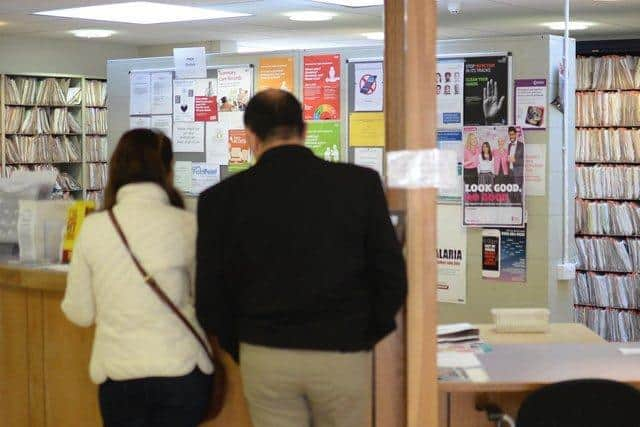GP appointments: seeing a doctor face-to-face rarer in Bucks than other regions
and live on Freeview channel 276
Latest data shows just over half of GP appointments in Bucks are now taking place face-to-face rather than remotely.
New figures uncovered by National World show that in Bucks over 40% of appointments are still conducted remotely, in other regions three quarters are now in person.
Advertisement
Hide AdAdvertisement
Hide AdOut of 104 Clinical Commissioning Group (CCG) areas in England, only 22 conducted fewer appointments in person than GPs in Bucks CCG.


Overall, 53.38% of Bucks patients saw a GP face-to-face significantly lower than the 74.29% in country-leading, North Tyneside.
At least 43.99% of appointments in Bucks were completed over the phone or via a video call last month.
Out of face-to-face appointments a vast majority are now completed in-house, only 1,776 appointments involved a GP popping round to a patient's home.
Advertisement
Hide AdAdvertisement
Hide AdRemote chats were mainly done over the phone in Bucks, 90,650 telephone chats were recorded in the new data, only 294 video calls were confirmed.
Patients’ body Healthwatch said some people struggled with remote appointments, such as those who speak English as a second language, and called for NHS England to carry out a full review of access to surgeries.
The British Medical Association, the doctors’ trade union, said GPs were “doing their best to give as many patients as possible the appointments they need safely” amid huge backlogs and staffing shortages.
Bucks-specific and nationwide data shows little has changed since lockdown when it comes to GP appointments.
Advertisement
Hide AdAdvertisement
Hide AdIn England, telephone or online calls made up 39% of all appointments in August, the first full month since coronavirus restrictions were lifted.
This compares with 41% in January, during the winter lockdown.
The ability to book face-to-face appointments remains a hotly debated topic, with the BMA warning that its members are facing increasing hostility from some patients over the issue.
Earlier this month, health secretary Sajid Javid called on GPs to provide more face-to-face appointments, telling MPs that “life is starting to return almost back to completely normal” after the pandemic.
Advertisement
Hide AdAdvertisement
Hide AdNHS England issued guidance in May stating that “practices should respect preferences for face-to-face care unless there are good clinical reasons to the contrary”.
And a Department of Health and Social Care spokesperson said yesterday: “We are clear GP practices must provide face to face appointments to those who want them, alongside remote consultations.”
A 27-year-old woman had to call her doctors’ surgery more than 20 times to get an in-person appointment which revealed her cancer diagnosis.
Jessica Brady, of Stevenage in Hertfordshire, had a number of virtual appointments over five months that failed to spot her tumour before she died.
Advertisement
Hide AdAdvertisement
Hide AdHer mum, Andrea, told MPs at the Health and Social Care Committee on 14 September, that if doctors would have seen her daughter sooner, she might still be here.
Andrea said: “We feel, and Jess felt, that no one listened, no one took it seriously.”
Jacob Land, head of policy at Healthwatch, said they wanted NHS England to carry out a full review of primary care access to “ensure services work for both patients and staff”.
He said primary care needed a flexible model which gives patients the choice of how and where they are seen.
Advertisement
Hide AdAdvertisement
Hide AdHe said: “Remote appointments have been hugely positive for some people, and they create opportunities to make care more flexible.
“However, they are not always the best approach for everyone or every circumstance, including people who don’t have access to the Internet, for whom English is not first language or those in a mental health crisis.”
Organisations representing doctors said GPs were working harder than ever amid a nationwide staffing shortage.
Dr Mark Sanford-Wood, of the BMA, said: “GPs are doing their best to give as many patients as possible the appointments they need safely, against a backdrop of a shortage of GPs, all the while still working within the national guidance of infection control and social distancing measures.
Advertisement
Hide AdAdvertisement
Hide Ad“We didn’t have enough GPs before the pandemic, and we don’t have enough now. Sadly, there are 1,904 fewer fully qualified full-time GPs than there were in 2015.
“Every part of the NHS is under an immense burden like never before.”
Professor Martin Marshall, Chair of the Royal College of GPs, said: "Ultimately we need more GPs and other members of the practice team to deliver the care our patients need.”
But he said telephone appointments did have their advantages.
Advertisement
Hide AdAdvertisement
Hide AdHe said: “The narrative that remote consultations are substandard compared with seeing a GP face to face is concerning.
“GPs, nurses, pharmacists and others working in general practice strive to deliver the same high-quality care whether a consultation is remote or in person.
“Some patients prefer remote consultations as they can be more convenient and fit around other commitments - and some people are more likely to access care when they need it remotely as opposed to going to a surgery or feel more comfortable discussing certain aspects of their health.”
An NHS spokesperson said: “Every GP practice must provide face-to-face as well as telephone and online appointments as part of making primary care as accessible as possible for patients - the latest figures show that around 24 million appointments were delivered in August alone, above pre-pandemic levels, with more than half delivered in person.
Advertisement
Hide AdAdvertisement
Hide Ad“Record numbers of people are now training to become GPs, with up to 4,000 new starters this year and the NHS invested £270 million to expand general practice capacity during the pandemic on top of rising investment over the last five years.”